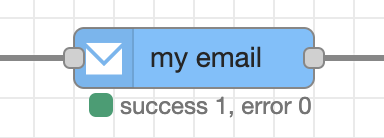node-red-contrib-email
v0.3.0
Published
SMTP email node for Node-RED
Downloads
683
Readme
node-red-contrib-email
SMTP email node for Node-RED

Installation
You can install by using the Menu - Manage Palette option, or running the following command in your Node-RED user directory - typically ~/.node-red
cd ~/.node-red
npm install --save node-red-contrib-emailRequirements
NodeJS version >= 6.0.0
Node-RED >= 2.0.0
SMTP (Transport) Config Node
- host - is the hostname or ip address to connect to
- port - is the port to connect to
- secure – if true the connection will use TLS when connecting to server. If false (the default) then TLS is used if server supports the STARTTLS extension. In most cases set this value to true if you are connecting to port 465. For port 587 or 25 keep it false
- auth - authentication 'none' or 'login'
- proxy - is a proxy URL, for example 'http://proxy-host:1234'
Send Mail Node Input
- from - The email address of the sender. All email addresses can be plain ‘[email protected]’ or formatted '“Sender Name” [email protected]', see Address object for details
- to - Comma separated list or an array of recipients email addresses that will appear on the To: field
- cc - Comma separated list or an array of recipients email addresses that will appear on the Cc: field
- bcc - Comma separated list or an array of recipients email addresses that will appear on the Bcc: field
- subject - The subject of the email
Message Payload
msg.payload can be used for one of the following message versions. Set the node property payload type to set the version of your msg.payload.
- text - The plaintext version of the message as an Unicode string, Buffer, Stream or an attachment-like object ({path: ‘/var/data/…'}). If you're sending a
msg.payloadof type number or boolean, then it is converted to string. - html - The HTML version of the message as an Unicode string, Buffer, Stream or an attachment-like object ({path: ‘http://…'})
- amp - AMP4EMAIL specific HTML version of the message, same usage as with text and html. See AMP example below for usage or this blogpost for sending and rendering.
Attachments
Set msg.email.attachments as an array of attachment objects (see Using attachments for details). Attachments can be used for embedding images as well.
msg.email = {
attachments: [
{
// utf-8 string as an attachment
filename: "text1.txt",
content: "hello world!",
},
{
// binary buffer as an attachment
filename: "text2.txt",
content: new Buffer("hello world!", "utf-8"),
},
{
// file on disk as an attachment
filename: "text3.txt",
path: "/path/to/file.txt", // stream this file
},
{
// filename and content type is derived from path
path: "/path/to/file.txt",
},
{
// stream as an attachment
filename: "text4.txt",
content: fs.createReadStream("file.txt"),
},
{
// define custom content type for the attachment
filename: "text.bin",
content: "hello world!",
contentType: "text/plain",
},
{
// use URL as an attachment
filename: "license.txt",
path: "https://raw.github.com/nodemailer/nodemailer/master/LICENSE",
},
{
// encoded string as an attachment
filename: "text1.txt",
content: "aGVsbG8gd29ybGQh",
encoding: "base64",
},
{
// data uri as an attachment
path: "data:text/plain;base64,aGVsbG8gd29ybGQ=",
},
{
// use pregenerated MIME node
raw:
"Content-Type: text/plain\r\n" +
"Content-Disposition: attachment;\r\n" +
"\r\n" +
"Hello world!",
},
],
};Overwrite Node Properties
Use the node editor to define the email fields or overwrite this properties with a flow msg:
msg.email = {
from: "[email protected]",
to: "[email protected]",
subject: "Test",
text: "This is the plain text version.",
html: "<h1>This is the html version</h1>",
attachments: [
{
// utf-8 string as an attachment
filename: "text1.txt",
content: "hello world!",
}
],
};Only overwrite email.to:
msg.email = {
to: "[email protected]"
};Example for amp message:
msg.email = {
from: "Nodemailer <[email protected]>",
to: "Nodemailer <[email protected]>",
subject: "AMP4EMAIL message",
text: "For clients with plaintext support only",
html: "<p>For clients that do not support AMP4EMAIL or amp content is not valid</p>",
amp: `<!doctype html>
<html ⚡4email>
<head>
<meta charset="utf-8">
<style amp4email-boilerplate>body{visibility:hidden}</style>
<script async src="https://cdn.ampproject.org/v0.js"></script>
<script async custom-element="amp-anim" src="https://cdn.ampproject.org/v0/amp-anim-0.1.js"></script>
</head>
<body>
<p>Image: <amp-img src="https://cldup.com/P0b1bUmEet.png" width="16" height="16"/></p>
<p>GIF (requires "amp-anim" script in header):<br/>
<amp-anim src="https://cldup.com/D72zpdwI-i.gif" width="500" height="350"/></p>
</body>
</html>`,
};Send Mail Node Output
output msg.payload includes the result, the exact format depends on the transport mechanism used
msg.payload.messageId- most transports should return the final Message-Id value used with this propertymsg.payload.envelopeincludes the envelope object for the messagemsg.payload.acceptedis an array returned by SMTP transports (includes recipient addresses that were accepted by the server)msg.payload.rejectedis an array returned by SMTP transports (includes recipient addresses that were rejected by the server)msg.payload.pendingis an array returned by Direct SMTP transport. Includes recipient addresses that were temporarily rejected together with the server response response is a string returned by SMTP transports and includes the last SMTP response from the server
Connection Test
SMTP connection is verified at node startup and displayed as node status. Be aware though that this call only tests connection and authentication but it does not check if the service allows you to use a specific envelope From address or not.
More Information
This node is based on nodemailer. Read their documentation for a deeper understanding:
Feature Requests
Feel free to contact me for any feature request.
Features not implemented yet:
- OAuth2 authentication
- Pooled SMTP
- Delivery status notification
- Calendar events



